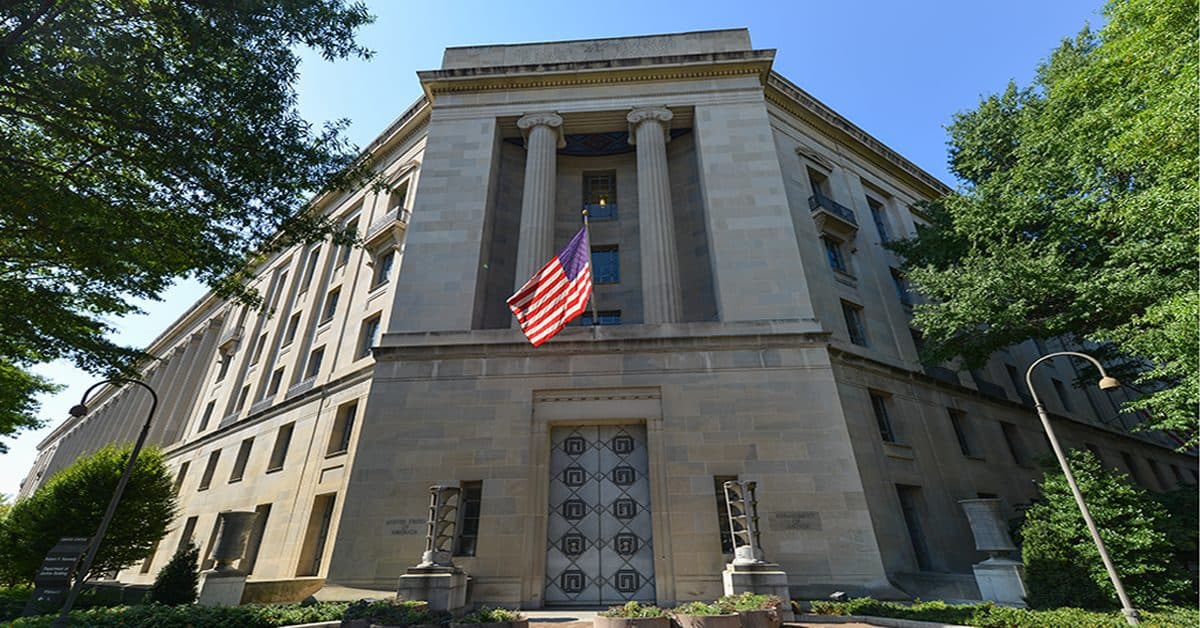US Justice Department To Launch National Cryptocurrency Enforcement Team
Former CFTC enforcement attorney: “Those in the [digital asset] space should expect additional scrutiny.”

Department of Justice, Washington D.C.
- US Deputy Attorney General Lisa Monaco described the unit as a way “to protect consumers”
- The DOJ also announced the formation of another initiative that would focus on civil cyber fraud and fine Federal contractors who don’t appropriately adhere to cybersecurity standards
The US Justice Department announced the launch of the National Cryptocurrency Enforcement Team (NCET) on Wednesday, which will tackle money laundering, cyber crime and various other crypto-related offenses.
The initiative will focus on “combating misuse of cryptocurrency”, Deputy Attorney General Lisa Monaco said at the Aspen Institute Cyber Summit. In addition, the unit would assist in recovering assets lost to extortion and fraud, the DOJ said.
“The point is to protect consumers,” she added in her speech on Wednesday. “Cryptocurrency exchanges want to be the banks of the future, well we need to make sure that folks can have confidence when they’re using these systems, and we need to be poised to root out abuse.”
Under the supervision of Assistant Attorney General Kenneth Polite Jr., the unit would consist of cybersecurity and anti-money laundering experts. Additional names of individuals in the NCET were not publicly disclosed as of press time.
Braden Perry, a former CFTC enforcement attorney and a partner at Kennyhertz Perry, described the news as “a signal that the DOJ will evolve with cryptocurrency advances and aggressively prosecute [those] who utilize technology to profit from abuse.”
“Traditionally, bad actors have been able to take advantage of the lack of regulatory framework, understanding the regulatory framework lags innovation, and [taking] this advantage to outrun prosecution,” Perry said to Blockworks.
The DOJ also announced the formation of another initiative on Wednesday, one that focuses on civil cyber fraud and that will fine Federal contractors who don’t appropriately adhere to cybersecurity standards.
“For too long, companies have chosen silence under the mistaken belief that it is less risky to hide a breach than to bring it forward and to report it,” said Monaco, of the Civil Cyber-Fraud Initiative. “Well that changes today. We are announcing today that we will use our civil enforcement tools to pursue companies, those who are government contractors who receive federal funds, when they fail to follow required cybersecurity standards — because we know that puts all of us at risk.”
The two initiatives follow a slew of news regarding accusations around alleged ransomware criminals and illicit payment activity.
In May, Russia-based DarkSide hackers targeted the largest fuel pipeline in the United States — the Colonial Pipeline System. The Justice Department later announced that it had recovered over $2 million worth of the extorted bitcoin. Most recently, the Biden administration blacklisted Suex, an obscure over-the-counter (OTC) cryptocurrency broker serving the Russian market, for allegedly facilitating money laundering.
“I think you’ll see the DOJ and the IRS, SEC, CFTC, and other federal and state regulators work together to root out what they deem wrongful conduct in the cryptocurrency and blockchain technology spaces,” Perry said.
“This has been a moving target. And those in the space should expect additional scrutiny.”
The Department of Justice did not immediately respond to requests for comment.






